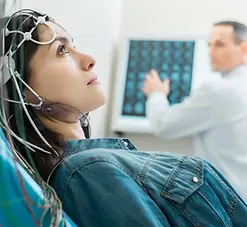
Neurology Services in Las Vegas, NV
Dr. Milford
I grew up in Kansas and did most of my medical training at the University of Kansas,
including medical school, residency, and fellowship. I also did one year of fellowship
training at Johns Hopkins. From an early age I knew I wanted to eventually become
a doctor through the influence of my father, who was an oral surgeon. I also
developed an interest in music through the influence of my mother, who was a
music teacher. I developed an interest in neurology after reading a book in college
called “The Man who Mistook his Wife for a Hat”, by neurologist Oliver Sacks. It was
about a man who was becoming demented. I was fascinated. The fact that everything
about who we are is determined by our brain fascinates me to this day. In medical school, my interest in neuroscience made the courses easy for me, and I simply “followed my bliss” from there to where I am today. At one time, I performed as a musician, but these days my interest in music manifests in my seeing live music of all kinds.
SUNRISE IS EQUIPPED TO DIAGNOSE AND TREAT:
For more information on neurological disorders or treatment, please click here to review the National Library of Medicine.
Acute Spinal Cord Injury | Alzheimer's Disease | ALS | Ataxia | Bell's Palsy | Cerebral Aneurysm | Epilepsy
Guillain-Barré Syndrome | Headaches | Head Injuries | Hydrocephalus | Lumbar Disk Disease | Meningitis
Migraine | Multiple Sclerosis | Muscular Dystrophy | Parkinson's Disease | Stroke | Traumatic Brain Injury
MEDICAID | MEDICARE | SELF-PAY | COMMERCIAL INSURANCE ACCEPTED
Give us a call or check to see if we accept your specific insurance plan here!
Same Day - Same Week Appointments Available!
DIAGNOSTIC TESTING
These diagnostic procedures are performed in office by our neurologists and certified technicians.
ELECTROENCEPHALOGRAPHY (EEG)
Electroencephalography (EEG) is the measurement of electrical activity produced by
the brain as recorded from electrodes placed on the scalp. An EEG is used to help
diagnose the presence and type of seizure disorders, confusion, head injuries,
brain tumors, infections, degenerative diseases, and metabolic disturbances
that affect the brain. It is also used to evaluate sleep disorders and to
investigate periods of unconsciousness.
AMBULATORY ELECTROENCEPHALOGRAM (aEEG)
Brain activity fluctuates second to second. Routine EEGs measure brain activity
for 20-40 minutes. If abnormal brain activity only happens every few
hours, or at certain times of the day, a routine EEG may not pick
up on this. Sunrise is equipped to provide an Ambulatory
Electroencephalogram (aEEG), which will record your brain
activity over a 24-72 hour period of time. A machine will be
positioned on your head, and a take home monitoring system
will be provided to record your brain activity during the exam, and
returned to the office for the doctor to review your brain activity to
further diagnose or treat your condition.
ELECTROMYOGRAPHY (EMG)
An Electromyogram (EMG), used in conjunction with a neurological examination,
helps establish a diagnosis and the extent of a problem by measuring the
electrical activity of a muscle in response to stimulation. An EMG is performed
by a medical doctor, and is done by inserting electrodes in fine needles into
the muscles being tested, and by placing electrodes on the skin over peripheral
nerves. An EMG is typically used to evaluate problems, including nerve damage
from compression by a disk in the neck or back; nerve compression
from carpal tunnel syndrome; neuromuscular diseases, such as amyotrophic
lateral sclerosis (ALS), poliomyelitis, myasthenia gravis, and muscular
dystrophy; and peripheral neuropathy caused by such conditions as
diabetes, pernicious anemia, and heavy metal toxicity.
NERVE CONDUCTION VELOCITY TEST (NCV/NCS)
A Nerve Conduction Velocity Test (NCV), also known as a Nerve
Conduction Study (NCS), is a test commonly used to evaluate the function,
especially the ability of electrical conduction, of the motor and sensory nerves of the human body. Nerve conduction studies are mainly used for the evaluation of paresthesia (numbness, tingling, burning) and/or weakness of the arms and legs. It can be used to diagnose disorders of the peripheral nerves and muscles.





